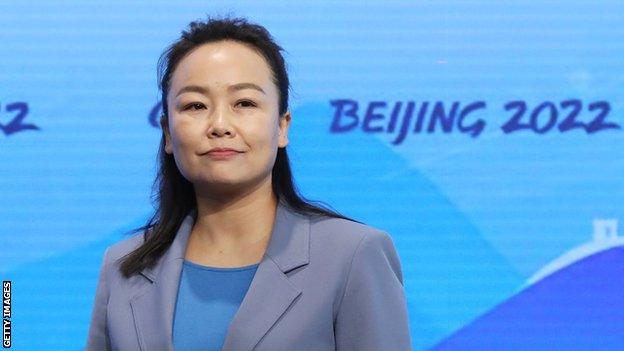Winter Olympics: Games official claims stories of human rights abuses are 'lies'
- Published

Yan Jiarong is a former member of the Chinese delegation to the UN general assembly
The Winter Olympics is facing renewed political controversy after a Games official dismissed claims of human rights violations against the Uyghur Muslim population as "lies".
Beijing Games spokesperson Yan Jiarong also said that Taiwan is part of China.
While Taiwan is a self-governed democratic state, Beijing sees it as part of its territory.
The International Olympic Committee has said repeatedly that the Games should be free from politics.
Yan made her comments at a daily media briefing on Thursday.
She spoke after IOC spokesman Mark Adams was asked at a news conference about Taiwan's presence at Sunday's closing ceremony on Sunday.
Following his comments, Yan said: "There is only one China."
Her statement reiterates China's stance towards Taiwan, which it claims as its own "sacred" territory. In the past year, China has stepped up pressure to isolate the island from its international allies.
Later, she intervened when a reporter directed a question to the IOC about material from China's Xinjiang region being used in clothing.
"The so-called forced labour in Xinjiang is lies made up by deliberate groups," Yan said.
Human rights groups have accused some textile companies who source materials from Xinjiang of ignoring abuses of the Uyghur population in the region.
China denies all accusations of abuse and has repeatedly denied allegations that it runs a network of forced labour camps in Xinjiang.
The US has accused China of genocide in its repression of the Uyghurs - an allegation China has also strongly and repeatedly denied.
Amid a diplomatic boycott of the Winter Olympics by the United States, Britain and other Western nations over China's human rights records, the IOC has tried to keep politics out of the Beijing Games.
Athletes have been told to stick to the IOC's Rule 50, which bans political statements on the medals podium and in competitions.
The rule, slightly revised before last year's Tokyo Games to allow for some protests on the field of play if first cleared with the IOC, was thrust into the spotlight in the run-up to the Olympics.
"We are always against the idea of politicising the Games. The IOC has 206 members, including the Peoples' Republic of China and the National Olympic Committee of Chinese Taipei," Yan said.
Taiwan competes in most sporting events, including the Olympics, as Chinese Taipei at the insistence of Beijing, which sees Taiwan as part of "one China".
Taiwan took part in the Games' opening ceremony after the team said it had received "several notices" from the IOC to attend both the opening and closing ceremonies.
In January, it had initially said it could not attend due to delayed flights and Covid-19 rules.

'I can't wait to get started': The remarkable story of Christian Eriksen's comeback as he returns to the Premier League
'All good music makes me happy': A tasteful selection of mood-lifting songs curated by Martin Freeman
